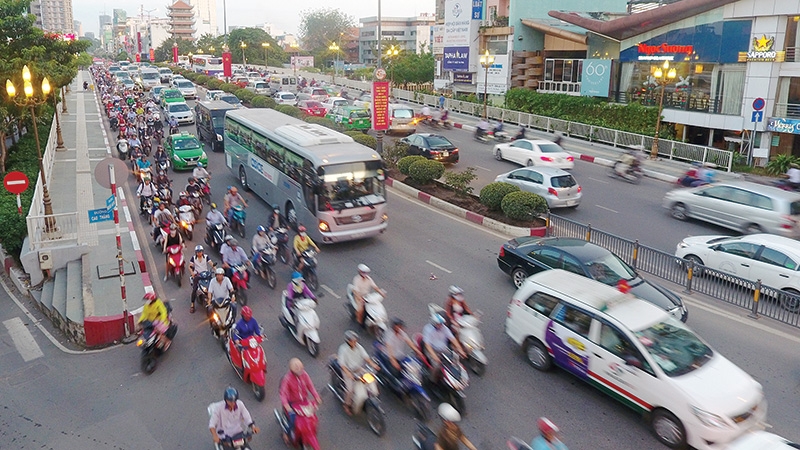Ride-hailing rule concerns persist
 |
| Experts see continued expansion of ride-hailing services thanks to their convenience, Photo: Le Toan |
Speaking at a meeting with the executives of leading global firms on the sidelines of the World Economic Forum in Davos in January, Prime Minister Nguyen Xuan Phuc said that Vietnam aims to develop a legal framework that will accommodate the new technologies of Industry 4.0 and accelerate public-private partnership to create environmentally friendly breakthrough products and services.
“Industry 4.0 is knocking on the doors of every single enterprise, bringing about radical changes. Vietnam considers it a big opportunity when countries compete through innovation in addition to traditional means like trade liberalisation, scale, experience, labour, and capital,” the prime minister added.
In this spirit, Vietnam has become an emerging market for several disruptive firms. Ride-hailing firms like Grab, Go-Viet, FastGo, and Be have taken the country by storm with their services, bringing tremendous benefits to both customers and drivers.
However, the Ministry of Transport (MoT) is proposing to step up regulation of ride-hailing companies, aligning service firms with taxi operators. The proposed change has ignited the debate about how street-hailing and ride-hailing services should be managed.
The MoT recently submitted to the government the latest draft replacing Decree No.86/2014/ND-CP on business conditions for automobile transportation. Accordingly, the MoT maintains its proposal that electronic-contract-based vehicles using ride-hailing platforms like Grab, Go-Viet or Be must install taxi signs on the top of the vehicles – sending many wondering about the future of disruptive business models in Vietnam.
Nguyen Van Hau, chairman of the Ho Chi Minh City Bar Association, said, “The sharing economy is about the sharing of idle assets. Ride-hailing platforms under the model have generated employment and income for many people. It is clear that the proposed rule will increase unnecessary procedures and lead to the loss of jobs.”
Hau went on to say that customers will be harmed by the loss of competition, which will likely translate into higher prices, longer waiting times, and lower quality ride-hailing services.
Truong Thanh Duc, lawyer at BASICO law firm, said that Vietnam and some other countries are confused whether to classify ride-hailing apps as taxi firms or Internet-based service providers. “Their business model is unique, so I think the government should use technology to regulate or tax them. This reflects the nature of these firms and would prevent double taxation or tax evasion,” said Duc.
He added that despite their ambiguous legal status, ride-hailing apps should be allowed to operate in Vietnam as they benefit consumers, the economy, and push Vietnam towards Industry 4.0. “We should encourage new innovations in Vietnam’s transport system,” Duc emphasised.
Kenneth Atkinson, executive chairman of Grant Thornton, told VIR that ride-hailing services should be properly regulated and taxed. “The regulatory environment is the only possible risk to ride-hailing apps in Vietnam. I can only see continued expansion because of the growing popularity and the mindset of Vietnamese millennials, together with the growing acceptance and convenience for ride-hailing services.”
If the MoT’s regulation becomes effective, investors may be concerned about their decision to invest in the country. Meanwhile, consumers could lose the chance to benefit from modern and convenient services brought by technological advances.
With the Comprehensive and Progressive Agreement for Trans-Pacific Partnership already in effect and the EU-Vietnam Free Trade Agreement expected to be ratified this year, Vietnam is required to make greater efforts to ensure full compliance.
Among them, there are regulations to limit the government’s intervention in e-commerce activities like ride-hailers. Before proposed rules can come into force, legislators will need to make careful considerations to ensure it falls in line with Vietnam’s FTA commitments and does not stunt the country’s efforts to embrace new technology in Industry 4.0.
What the stars mean:
★ Poor ★ ★ Promising ★★★ Good ★★★★ Very good ★★★★★ Exceptional
 Tag:
Tag:
Related Contents
Latest News
More News
- Masan Consumer names new deputy CEO to drive foods and beverages growth (February 23, 2026 | 20:52)
- Myriad risks ahead, but ones Vietnam can confront (February 20, 2026 | 15:02)
- Vietnam making the leap into AI and semiconductors (February 20, 2026 | 09:37)
- Funding must be activated for semiconductor success (February 20, 2026 | 09:20)
- Resilience as new benchmark for smarter infrastructure (February 19, 2026 | 20:35)
- A golden time to shine within ASEAN (February 19, 2026 | 20:22)
- Vietnam’s pivotal year for advancing sustainability (February 19, 2026 | 08:44)
- Strengthening the core role of industry and trade (February 19, 2026 | 08:35)
- Future orientations for healthcare improvements (February 19, 2026 | 08:29)
- Infrastructure orientations suitable for a new chapter (February 19, 2026 | 08:15)





















 Mobile Version
Mobile Version